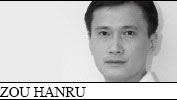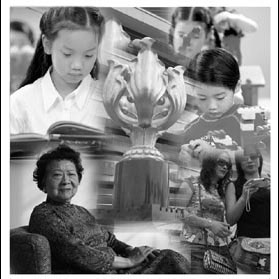Opportunity trumps wealth in Hong Kong
By Zou Hanru (China Daily)Updated: 2007-07-20 07:22
Hong Kong's rich-poor gap has grown to record proportions in recent years, figures released by the Census and Statistics Department suggest.
 The Gini Coefficient, the statistical measure of wealth equality, stood at
0.533 in 2006. It was 0.518 in 1996. The internationally recognized alert level
is 0.4. This puts Hong Kong ahead of many other developed and developing
economies, including the mainland.
The Gini Coefficient, the statistical measure of wealth equality, stood at
0.533 in 2006. It was 0.518 in 1996. The internationally recognized alert level
is 0.4. This puts Hong Kong ahead of many other developed and developing
economies, including the mainland.
To give readers a better idea of the size of the gap: The biggest earner in the city last year paid more in income tax than an average worker could possibly earn in 1,000 years.
These figures sound worrying enough. But they could only be telling half the story. As Mark Twain said more than a century ago: "There are three kinds of lies: lies, damned lies and statistics."
I do not use this quote to insinuate that such indexes are created to mislead the public. But it wouldn't hurt for us to look at these figures from a different perspective.
To begin with, such indexes have their limitations. As a matter of fact, there are many other types of statistics available to measure income equality: the Hoover coefficient, the Coulter coefficient, the Schultz coefficient, the Kullback-Leibler Redundancy, the coefficient of variation, middle-quintile share, you name it. Each deals with some aspects of income inequality while ignoring others.
The index in question - the Gini Coefficient - does not take into account the different definitions of poverty or purchasing power parity in different places.
And, as Secretary for Financial Affairs and the Treasury Chan Ka-keung pointed out in a Legislative Council meeting the other day, the index is also affected by such factors as the economic, population and family structure.
For instance, the increasing number of single-parent families has driven the index up. We must also not forget that many of the new migrants coming here for family reunions do not have the skills necessary to find a decent job. A large proportion of the population increase over the past decade was in this category.
In fact, major cities in Europe and North America are facing the same situation. New migrants tend to end up in slums and on the lowest rungs of society.
But even if the widening wealth gap is a reality, is it really as bad a thing as many people have been led to believe? Is it some kind of sin that some people are so much richer than others?
At least not in a capitalistic society like Hong Kong.

To put the wealth gap in a positive light: It serves as a motivation for people to move up the income ladder. It is the very reason people have to work hard.
The condition of the poor in Hong Kong is hardly comparable to their counterparts in third world countries. Ample sources of revenue for government coffers have made it possible for Hong Kong to cast a wide social security net. People in need are cared for. Starvation is never heard of in this city. Many of those who choose to sleep on the streets do so out of their own free will. Children go to school for free. Government loans are readily available to students who suffer from financial constraints but want to pursue higher education.
When underprivileged people and their offspring are given the opportunity to improve their lot and move up the social ladder through hard work, the wealth gap is not an incurable social ill.
What matters is "equality of opportunity", not "equality of wealth".
E-mail: zouhr@chinadaily.com.hk
(China Daily 07/20/2007 page10)
|
|
|
|